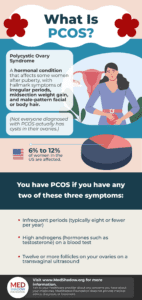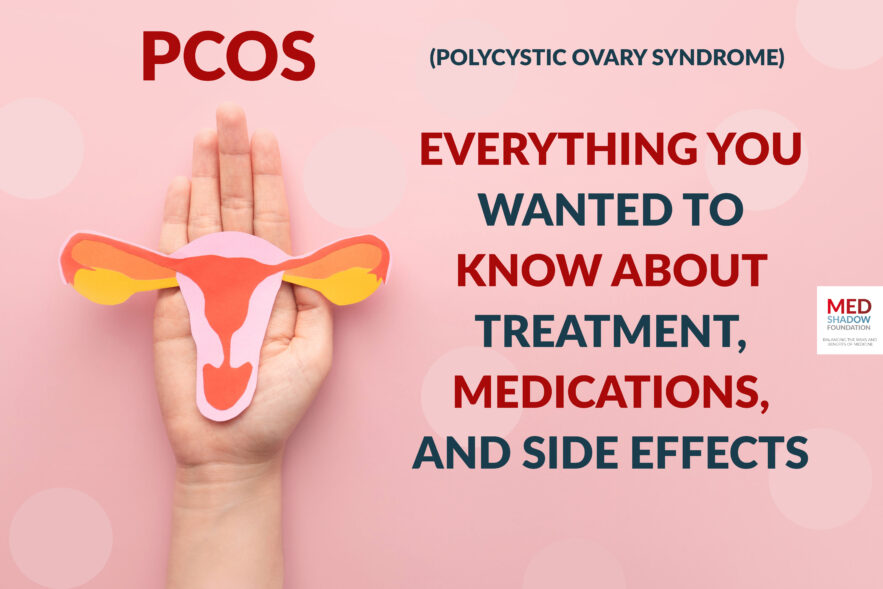
PCOS stands for polycystic ovary syndrome. It’s an unfortunately-named syndrome, as not everyone who is diagnosed actually has cysts on their ovaries. It’s a lifelong condition that affects women, with symptoms like irregular periods and male-pattern facial or body hair, that often emerge during puberty or early adulthood. Up to 6 to12% of women in the U.S. have PCOS, according to the Centers for Disease Control and Prevention (CDC).
The ovaries and sometimes adrenal glands—both of which produce hormones such as estrogen and testosterone—end up making the wrong amounts of these and other hormones. One of the most common characteristics of PCOS is excess testosterone in the blood. Women with PCOS may also have abnormal levels of other hormones, such as luteinizing hormone (LH) and follicle stimulating hormone (FSH) which govern a variety of processes in your body, including ovulation.
Many women with PCOS also develop insulin resistance, which leads to high blood sugar. It’s thought that androgen excess (testosterone is an androgen) and insulin resistance may worsen each other, perpetuating the condition. Moreover, some women then produce too much cortisol, the stress hormone produced by the adrenal glands, which leads to higher levels of both insulin and testosterone.
The “cysts” that some women with PCOS have on their ovaries are actually fluid-filled sacs that contain eggs. Typically, an egg is released from one of these sacs each month and travels to your uterus. If it is not fertilized, you shed your uterine lining and the egg itself during your period. However, the hormonal imbalance in PCOS prevents many women from ovulating regularly. Since the eggs aren’t released, the fluid-filled sacs that contain them collect on the ovaries.
PCOS Medical Animation Video
Researchers are still learning about PCOS, but your healthcare provider may diagnose you with PCOS if you have two out these three symptoms:
- Infrequent periods (typically eight or fewer per year)
- High androgens (hormones such as testosterone) on a blood test
- Twelve or more follicles on your ovaries on a transvaginal ultrasound
PCOS Symptoms
There are many different symptoms of PCOS, and they are not the same for everyone.
The most common symptoms include:
- Irregular and infrequent menstruation
- Hirsutism (excess hair growth on places like your chin and back that mimic patterns more commonly seen in men)
- Acne
- Weight gain, particularly around the stomach
Insulin resistance, which is commonly associated with PCOS and can lead to diabetes, often doesn’t cause any symptoms, but in some cases you may experience:
- Weight gain around your midsection
- Skin tags or darkened patches of skin (acanthosis nigricans)
Your hormones interact with many different systems in your body, like your immune system and your central nervous system, and can cause myriad symptoms that are not yet well understood, such as insomnia.
PCOS raises your risk for many other conditions including:
- Endometrial polyps or cancer, due to the thickening of your endometrial lining caused by infrequent menstruation
- Diabetes
- Depression, anxiety, bipolar disorder and obsessive compulsive disorder
- Sleep apnea
- High blood pressure and cardiovascular conditions
- Thyroid problems
Your Period and Breakthrough Bleeding with PCOS
Irregular and infrequent periods is one of the hallmark signs of PCOS. The imbalance in your hormones prevents you from releasing an egg each month. When you don’t release an egg, you might miss your period. You also are left with a small fluid-filled sac that contains an immature egg (also known as a follicle), which looks like a cyst on your ovary.
If you don’t get your period regularly, you don’t shed your uterine lining regularly either. This can lead to a thickening of the endometrium that can raise the likelihood you’ll develop endometrial cancer. You also may have heavier bleeding whenever you do get your period.
One of the goals of treating PCOS is to regulate your periods. If you are not trying to get pregnant, your healthcare provider may prescribe oral contraceptives. You still won’t necessarily ovulate with hormonal contraceptives, but with many brands, you will shed your uterine lining monthly.
A common side effect of birth control pills is breakthrough bleeding—bleeding at times when it’s not your period. Since you’re not ovulating when you take birth control, some doctors may tell you that breakthrough bleeding is not a problem for your overall health. However, it can be inconvenient, and it may also signify that your level of prostaglandin—a hormone involved in many processes, including inflammation—is too high. Taking a non-steroidal anti-inflammatory drug (NSAID) such as ibuprofen for five to seven days can lower prostaglandin and limit breakthrough bleeding.
It’s thought that prostaglandins and other inflammatory molecules are changed in PCOS, sometimes leading to chronic low-grade inflammation, even without treatment with oral contraceptives, but the research is preliminary.
What Causes PCOS?
There’s no one, single cause of PCOS, though there does seem to be a genetic component. About a quarter of women who have PCOS have mothers with the condition. There’s also preliminary evidence that exposure to endocrine disrupting chemicals found in the environment and products like pans with non-stick coatings, such as BPA and PFAS may raise your risk of developing PCOS. Researchers are still working to understand the interaction between genetics, environment, and lifestyle that may lead to PCOS. Learn more about PFAS and check out MedShadow’s tips for limiting your exposure to PFAS.
Can You Cure PCOS?
PCOS has not yet been cured, and it won’t necessarily go away completely, but you can treat it, with or without medication. Doing so can lower both your androgen and insulin levels and reduce your risk of developing complications, such as diabetes. If you’re trying to get pregnant, treatment can help you ovulate more regularly, enhancing the chances you’ll be able to get pregnant.
How Does PCOS Change as You Age?
The impacts PCOS has on your overall health can change over time. Women in their teens and 20s are more likely to have symptoms due to excess androgens such as unwanted facial hair and acne. As these women enter their 30s, they seem to be more likely to experience obesity, high cholesterol, insulin resistance, and diabetes.
Marcia Brumbaugh, PhD, for example, had irregular periods as a teenager. She wasn’t officially diagnosed with PCOS at the time, but she was put on birth control, which she took until she was in her 30s, and trying to conceive. Now, after having had two children, she says she’s noticed her weight seems to be increasing with no clear cause, and given a family history of diabetes, she expects that she may need treatment to prevent developing the disease at some point in the future.
Are PCOS and Endometriosis Related?
Both PCOS and endometriosis—a condition in which endometrial-like tissue grows outside of your uterus and causes pain—are common disorders that can impact your menstrual cycle and fertility, but they have distinct differences. Endometriosis tends to be characterized by pain. That pain is often in the lower abdomen, but can be anywhere in the body. The pain usually worsens closer to your menstrual cycle, and can be triggered during bowel movements and sex. It is possible to have both PCOS and endometriosis.
How Does PCOS Affect Weight and What is PCOS Belly?
Weight and PCOS have a complex relationship. It’s not clear if excess weight raises the risk of PCOS or if PCOS causes excess weight. Obesity is common among women with PCOS. One of the characteristics of PCOS is that women with the condition carry their weight differently. Even women with “lean PCOS,” who do not have overweight or obesity, are more likely to carry excess fat on their stomachs, rather than their hips or other areas.
It is known that, for women who are able to, losing weight can improve symptoms. However, many women with PCOS and obesity have a more difficult time losing weight than the average woman, due to insulin resistance.
If you carry extra weight, it’s important to know that you may metabolize some drugs differently than the average individual, leading to differences in the drug’s effectiveness and side effects.
Does Everyone with PCOS Get Diabetes?
More than half of women with PCOS will be diagnosed with type 2 diabetes by the time they’re 40-years-old, according to the CDC. Women with PCOS can make the hormone insulin, but their bodies often don’t use it efficiently enough. It’s important that your healthcare provider tests your blood sugar during your primary care appointments so you can catch any signs of insulin resistance early.
Is PCOS an Autoimmune Disease?
A 2023 review explains that the higher androgen levels seen in many people with PCOS alters the immune system’s function. This, in turn, causes chronic low-grade inflammation which can cause further reproductive problems and raise your risk for many other conditions. The inflammatory changes seen in PCOS is similar to what we see with some autoimmune diseases, but, the authors note, understanding this association requires far more research.
People with PCOS may also have autoimmune conditions like Hashimoto’s, a disease in which your immune system attacks your thyroid. While some of the symptoms of PCOS and hypothyroidism caused by Hashimoto’s are similar, such as weight gain, having the conditions simultaneously can worsen their impacts on your metabolism, so it’s crucial for your healthcare provider to monitor your thyroid function if you have PCOS.
Lifestyle Changes and Weight Loss for PCOS
If you have PCOS and you carry extra weight, losing weight can help lower your androgen levels and increase your insulin sensitivity. This can help with symptoms like excess facial hair and acne.
Maintaining a healthy diet and exercising regularly may even help you conceive. Unfortunately, the hormonal imbalances associated with PCOS can make it difficult for some women with PCOS to lose weight.
PCOS Diet
Any diet that helps you lose weight can help with PCOS symptoms if you carry extra weight. A low-carb diet can be especially helpful if you have insulin resistance. White breads, pastas, and other simple carbohydrates can spike your blood sugar and worsen insulin resistance. Studies have found that when women got less than 45% of their calories from carbohydrates, they lost more weight and improved insulin levels, hormone levels and ovulation regularity.
Since women with PCOS may have chronic inflammation that exacerbates the condition, an anti-inflammatory diet can also be helpful. In one study, women with PCOS who carried extra weight lost about 7% of their body weight and reduced the prevalence of diabetes after following a reduced-calorie anti-inflammatory diet which included small, frequent meals throughout the day for 12 weeks. Additionally, the women saw improvement in a variety of markers on blood tests such as insulin, C-reactive protein (a measure of inflammation), and cholesterol. One study showed it may help you get pregnant. The Mediterranean diet is a type of anti-inflammatory diet that includes fruits, vegetables, whole grains, lean meats, fish, and olive oil. Download MedShadow’s Mediterranean Diet guide here.
If you think you might be sensitive to specific foods or food groups, you may benefit from trying an elimination diet or The Whole 30 diet to determine which foods irritate your body. Then, limit these specific foods and continue following an anti-inflammatory diet.
Denavi Patil describes her experience using an anti-inflammatory diet and regular exercise to manage her PCOS in MedShadow’s Power to the Patient Podcast.
Exercise for PCOS
In addition to helping you maintain a healthy weight, physical activity can help people with PCOS stave off depression. Resistance training, like lifting weights and moderate exercise, like brisk walking, have both been shown to help PCOS symptoms. Walking for 30 minutes a day reduced several signs of chronic inflammation in women with PCOS, according to a small study.
Check out MedShadow’s guide to safe outdoor exercising.
A small trial of 28 women with PCOS showed that just eight weeks of high intensity interval training lowered their weight, waist-to-hip ratio, cholesterol levels, and insulin resistance.
Exercising can also help you get pregnant, even if you don’t lose weight.
Anxiety, Depression, and Mental Health in PCOS
Women with PCOS have a higher risk of developing mental illnesses such as anxiety, depression, bipolar disorder, eating disorders, and obsessive compulsive disorder. Many women with PCOS experience more frequent problems with sleep and anxiety than the general population, even if they aren’t severe enough to warrant a diagnosis of insomnia or anxiety. Researchers are still studying why this is and what might help treat or prevent these conditions.
One small trial found that 12 weeks of cardiovascular exercise—either high intensity interval training (HIIT) or continuous moderate intensity exercise, improved symptoms of anxiety, depression and stress in women with PCOS.
Cognitive behavioral therapy (CBT) may help with symptoms of anxiety, but not necessarily depression, associated with PCOS according to a 2022 meta-analysis.
Read about how starting a walking habit helped PCOS-patient, Melissa Finley, manage both her weight and her mood, along with lowering her dependency on medications.
Can You Get Pregnant with PCOS?
PCOS is the most common cause of infertility, and it is frequently diagnosed when a woman is trying to conceive. However, many women with PCOS have healthy pregnancies, even without fertility treatments.
The main reason it can be difficult for a woman with PCOS to get pregnant is that you don’t ovulate regularly. You may not know when you’re likely to release an egg. Sometimes, taking metformin, a diabetes drug commonly used to treat insulin sensitivity and PCOS, can help you start to ovulate more regularly. Other women may be prescribed drugs designed to induce ovulation such as clomiphene citrate, letrozole, or gonadotropins in addition to metformin. In some cases, if the medications don’t work, your physician may recommend ovarian drilling, a procedure in which your doctor uses heat or lasers to kill some of the tissue on your ovaries that produces androgens.
Pregnancy and PCOS
Because PCOS raises your risk of diabetes and high blood pressure, once you get pregnant, you may be at increased risk for gestational diabetes and pre-eclampsia. You’ll also have a heightened risk of experiencing a miscarriage, preterm birth, or giving birth via cesarean section (c-section). Brumbaugh experienced a miscarriage prior to giving birth to her first son, and also had to manage gestational diabetes during her second pregnancy. “I consider myself pretty lucky I was able to manage it with diet and exercise,” she says. However, it did take, “obsessive tracking using the blood sticks and like carb counting.”
If you are pregnant or hoping to become pregnant, be sure to discuss the risks specific to you and your PCOS with your physician and ask if any treatments or lifestyle changes may lower your risk of complications. Maintaining a healthy lifestyle before and during pregnancy can minimize these risks.
PCOS Medication
There is no single drug to treat PCOS. And in some cases, lifestyle changes may be all you need. But many women will be prescribed drugs to help manage individual symptoms or achieve a goal such as getting pregnant.
Birth Control for PCOS
If you are not trying to get pregnant, contraceptives are typically the first treatment your doctor will recommend. The drugs can raise your levels of estrogen and progesterone, along with sex hormone binding globulin (SHBG), which binds to excess testosterone and prevents it from affecting you. This can help alleviate some symptoms caused by excess androgen, such as facial hair, body hair, acne, and more.
The pill will stop you from ovulating, but most brands will cause you to have a period once every four weeks. (Some brands allow you to skip menstruation for a longer period of time). Bleeding regularly (or shedding your uterine wall) will help lower your risk of endometrial cancer.
Scientists are still working to understand the side effects of birth control, especially in the specific case that you take it for PCOS.
However, some of the known side effects of contraceptives for PCOS include:
- Spotting or breakthrough bleeding
- Migraines
- Weight gain
- Fluid retention
- Nausea
- Breast tenderness
- Blood clotting
- Mood changes or depression
- Risk of developing high cholesterol
Androgen Blockers (Spironolactone) for PCOS
Spironolactone blocks androgens like testosterone from binding with receptors in your body. For PCOS, it’s typically helpful for women who have symptoms like facial hair, body hair, and acne. It can also help with weight and cholesterol in some women with PCOS. Spironolactone may be prescribed on its own or in conjunction with birth control pills or metformin.
In addition to blocking androgens, spironolactone is a diuretic, meaning it makes you urinate to get rid of excess fluid in your body. It’s also used to treat heart conditions such as high blood pressure and heart failure. The drug can dehydrate you, so make sure you drink plenty of fluids.
Spironolactone can also come as a cream that you apply to your face to treat facial hair and acne only.
Side effects of spironolactone pills for PCOS include:
- Dehydration
- Dizziness
- Fatigue
- Cramps
- Breast pain
- High potassium levels or low sodium levels, both of which can lead to heart rhythm problems
Metformin for PCOS
Metformin is an older drug for diabetes. It’s frequently prescribed for women with PCOS who carry extra weight or who have insulin resistance, since the condition is related to diabetes. However, along with helping women with PCOS lose weight and improve insulin sensitivity and cholesterol, newer research has suggested that the drug may help improve your hormone levels, regulate your period, and help you get pregnant. It may also lower your risk of developing bipolar disorder. It can be prescribed on its own or alongside other treatments like birth control pills or spironolactone. If you’re trying to get pregnant, your provider may take you off of birth control and instead prescribe metformin. It works best when used in conjunction with diet and exercise.
Side effects of Metformin for PCOS:
When metformin was prescribed alone, women reported more gastrointestinal side effects, but fewer other types of side effects than when they received birth control pills for PCOS.
- Gastrointestinal distress (nausea, diarrhea, flatulence, bloating)
- Vitamin B deficiency
- Metallic taste in the mouth
Weight Loss Drugs for PCOS
Weight loss can help alleviate symptoms of PCOS, but many women with PCOS struggle to maintain a healthy weight. Some treatments, like metformin may help women lose weight, but for others, weight loss drugs may help. Since Wegovy (semaglutide) was approved for weight loss in patients with obesity or weight-related conditions such as high cholesterol, it has become a popular option among women with PCOS.
The most common side effects of Wegovy are:
- Nausea and vomiting
- Diarrhea
- Loss of thirst and dehydration
- Thinning of the face which can make you look older
Gastrointestinal side effects are common in the first six weeks of use, and tend to fade over time. Many people report that eating smaller, frequent meals and avoiding fatty foods helps.
There are also some more serious side effects. In most cases, these concerns are associated with rapid weight loss, no matter how it is achieved.
- Intestinal obstruction
- Malnutrition
- Medullary thyroid cancer in those with a family history of the disease.
Read more about the side effects of Wegovy here.
Fertility Drugs for PCOS
Women with PCOS may have trouble getting pregnant. To make it easier, your healthcare provider might suggest lifestyle changes or metformin to help regulate your cycle. After that, he or she may prescribe drugs that stimulate ovulation such as: Clomid (clomiphene), letrozole, or gonadotropins. Clomiphene is the most commonly used treatment to help women with PCOS get pregnant, and it can be used alongside metformin.
Side effects of clomiphene include:
- An increased risk of multiple births (6% of women who take it have twins)
- Headaches
- Hot flashes
- Gastrointestinal symptoms like nausea and vomiting
- Changes in vision (such as blurriness or seeing spots) that go away after you stop using the treatment.
Brumbaugh was able to conceive her first child after being prescribed clomiphene. She experienced irritability, bloating and headaches. At the time, she says, she considered the possibility of multiple births as a positive, so that she’d only have to be pregnant once.
Side effects of letrozole include:
- Headaches
- Hot flashes
- Abdominal pain and bloating
- Fatigue
- Drowsiness
- Forgetfulness
Side effects of gonadotropins include:
- Higher likelihood of multiple births than with clomiphene
- Abdominal discomfort
- Nausea and vomiting
- Ovarian hyperstimulation syndrome (OHSS), a rare, but dangerous condition in which your ovaries grow too large and can cause vomiting and blood clots.
Vitamins and Supplements for PCOS
It’s important to regularly screen for and treat vitamin deficiencies as many people with PCOS might develop eating disorders that limit the amount of nutrients they consume, and PCOS treatments like metformin can make it difficult for you to absorb certain vitamins such as vitamin B12.
Scientists are still working to understand how certain vitamins and supplements may help treat PCOS symptoms when you don’t have a deficiency, but a few of the most commonly used are inositol, spearmint tea, and omega 3 supplements.
Before taking any supplements, be sure to discuss them with your healthcare provider, and make sure that the label says their contents have been verified by a third party. Because supplements are not regulated as tightly as drugs, they can be contaminated or contain different amounts of active ingredients than the label suggests.
Inositol for PCOS
Inositol, which comes in the form of myo-inositol and D-chiro-inositol, is one of the most-studied supplements for a variety of PCOS symptoms, ranging from depression, to excess weight, to infertility. A lack of inositol may contribute to women with PCOS developing insulin resistance. The compounds can also be found naturally in nuts and seeds.
The supplements are thought to help with PCOS symptoms through their effects on insulin and anxiety. Some studies have shown that inositol can improve your egg quality and reduce your need for other fertility medicines.
Taking more than 12 grams of inositol per day may upset your stomach.
Spearmint Tea for PCOS
One small study found that women with PCOS who drank two cups of spearmint tea per day for 30 days had significantly lower levels of testosterone than women who drank a different herbal tea.
Omega-3 or Fish Oil Supplements for PCOS
Omega-3 fatty acids are naturally found in fatty fish like salmon, olive oils, nuts, and seeds. They’re an important part of a Mediterranean or anti-inflammatory diet, but if you have trouble getting enough in your food each day, you might consider taking a supplement. One 2020 meta analysis found that women with PCOS who took omega-3 supplements had fewer signs of inflammation in blood tests than women with the condition who didn’t.
Curcumin (Turmeric) Supplements
Curcumin supplements may help women with PCOS with their weight, cholesterol, and insulin, according to a small study. The supplements are thought to have an anti-inflammatory effect.






